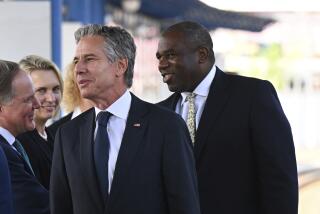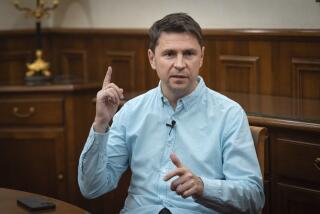Ukraine announces $15-billion Russia loan, gas price cut
KIEV, Ukraine — Ukraine’s beleaguered President Viktor Yanukovich reached agreement with Russia on Tuesday for a $15-billion loan and a more than 30% cut in the price of Russian natural gas, deals that aren’t likely to win him peace from his European-leaning opposition.
Thousands of protesters who had gathered in Kiev’s Independence Square responded to the news by demanding Yanukovich’s resignation and chanting: “Down with the gang!”
Yanukovich and Russian President Vladimir Putin announced the accord between the neighboring nations after a meeting at the Kremlin in Moscow. Yanukovich enraged his political opposition recently by rejecting trade ties with the European Union, presumably to avoid alienating Russia.
“Given the problems of Ukraine’s economy, connected to a greater degree with the world financial and economic crisis, and with the purpose of supporting Ukraine’s budget, the government of the Russian Federation decided to invest $15 billion … in Ukrainian government bonds,” Putin said at a news conference after the meeting.
After years of arguments over energy, Putin also said Russia would reduce the price of natural gas it sells to Ukraine to $268.50 per thousand cubic meters from $410, providing a significant boost to Ukrainian industry.
Yanukovich appeared pleased with the results. He said the negotiations were not “simple” and gave Putin credit for their success.
“I will put things the way they are: This work wouldn’t have been accomplished with such optimal speed but for the political will of Russia’s President Vladimir Vladimirovich Putin,” Yanukovich said at the news conference. “Today’s meeting proved that the interaction between Ukraine and Russia has a powerful base and good perspective for further development.”
Knowing Yanukovich’s dire political problems at home, Putin hastened to add that the two presidents “did not discuss at all the question of Ukraine joining the customs union,” a Russian-sponsored alliance of several post-Soviet states. Ukrainians who favor closer ties with Europe — a significant but not dominant percentage of the population — strongly oppose participation in the union and want to move away from Russia’s economic orbit.
When Yanukovich failed to sign an association and trade agreement with the EU last month, he said Ukraine would have needed at least $20 billion to adjust to the changes such a pact would entail.
Including the gas deal, he in effect received that amount from Russia. Critics said it came with strings attached.
“Putin would never give any money to anybody for nothing,” Ukrainian opposition leader Oleg Tyagnibok said in an interview. “The deals Yanukovich struck in Moscow are the price Moscow paid him for rejecting European integration.”
As the mass protests in downtown Kiev, the capital, entered the 26th day, opposition leader Arseny Yatsenyuk appealed to at least 20,000 people in Independence Square to continue their vigil day and night.
Some of the loudest cheers came for another opposition leader, Vitali Klitschko, the heavyweight boxing champion who announced Monday that he was ending his career to concentrate on Ukrainian politics. Appearing in the square, he called on Yanukovich — tongue in cheek — to face him in the ring.
“The biggest fight of my life is going on now and my opponent is Yanukovich,” Klitschko said in an interview. “The price for this fight is the prosperity of Ukraine and freedom, independence and real democracy for our people.”
Also Tuesday, opposition lawmakers physically blocked the speaker’s stand in the parliament, preventing passage of the 2014 budget.
One ruling party lawmaker, Alexander Volkov of eastern Ukraine, praised the deal with Russia, saying it would resolve trade and export problems for many Ukrainian businesses and could save thousands of jobs. He said the opposition was growing desperate.
With the agreement, he said, “our economy can get a second breath and start climbing out of its stupor. That means the return of economic and hence political stability, which the opposition leaders don’t want because their big moment is now and they see that they are losing it.”
Kost Bondarenko, director of the Ukrainian Policy Institute, a Kiev-based think tank, also characterized the deal as a win for Yanukovich.
“If the opposition leaders failed to capitalize on the huge numbers of people they have led out into the street in recent weeks, Yanukovich didn’t waste his time bargaining hard with both the European Union and Moscow,” he said in an interview. “He has achieved an amazing deal with Moscow that, for all the perks Ukraine gets, still leaves its door open for future integration talks with Europe.”
Protesters in Independence Square, however, refused to accept that their efforts to unseat the government had failed.
“We were told today that we can’t win our fight in a day or two and we are ready for a long struggle,” said Pavlo Kruchina, a 34-year-old auto mechanic from the western city of Ternopol. “We know our families will never see the money Yanukovich brings from Moscow.”
Anyway, he said, “it is not about money — it is about either us or Yanukovich now.”
More to Read
Sign up for Essential California
The most important California stories and recommendations in your inbox every morning.
You may occasionally receive promotional content from the Los Angeles Times.









